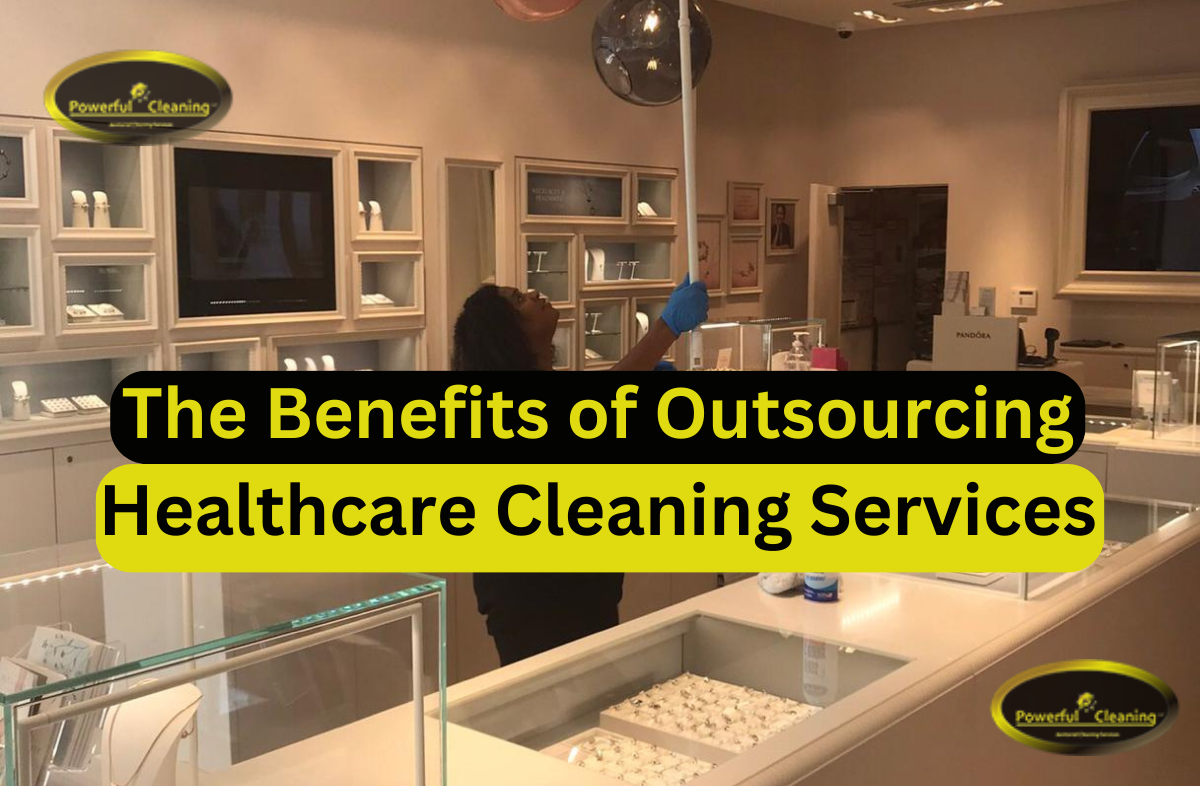The issue of maintaining cleanliness in a fast-changing healthcare environment where precision and safety are not negotiated becomes essential at this time. Cleanliness is vital in ensuring the health and safety of patients, doctors, and others who visit hospitals, clinics, and other healthcare settings. Institutions are now adopting a strategic perspective as the healthcare sector grows complex. They involve specialist external service providers for hygiene-related activities such as cleaning and laundry. The move toward outsourcing healthcare cleaning services corresponds with the growing demand in this industry. It constitutes an indispensable step in creating a safe, efficient, and effective environment for providing medical care.
Healthcare cleaning outsourcing has numerous benefits that are inherent to the healthcare system. In this regard, one of the most essential advantages is guaranteeing compliance with the highest standards of cleanliness. Cleaners in specialized firms, all too familiar with the latest technologies and everything about proper sanitation in such installations, painstakingly scrub clean all crevices of a healthcare establishment. However, this approach is highly specialized and goes beyond compliance in setting standards that make it virtually impossible for any formidable germ, such as a contagious pathogen, to thrive around.
Expertise and Specialization
Countless benefits extend beyond being clean, which can be obtained by outsourcing healthcare cleanings to specialized cleaning companies. A professional clean-up team is adequately trained in handling healthcare cleanliness to ensure that each person knows and adheres to the correct infection control measures, proper disinfection procedures, and how to manage hazardous materials safely. It remains an indispensable asset to hospitals in ensuring that the physical environments of health centers are always at par with industry requirements and in minimizing chances of cross-infections. In addition, contracting cleaning services guarantee a rigid adherence to numerous rules and norms set by several governmental organizations within the healthcare realm. The external cleaning specialists are up-to-date with the changing healthcare regulatory environment and ensure the facility meets all requirements. This increases patient and worker safety and improves one’s safeguards from strict compliances that will have serious legal and financial consequences on non-compliance in these strict regulations.
Improved Infection Control
Healthcare facilities should practice proper cleaning and disinfection to avoid spreading infections. Outsourced cleaning services guarantee a thorough cleaning of high-touch surfaces, rooms for patients, waiting areas, and medical equipment. Professional cleaning companies utilize industrial-quality disinfectants based on evidenced practices, thereby minimizing the occurrence of healthcare-associated infections to a great extent.
Focus on Core Activities
Healthcare staff can focus on other activities like caring for patients, administering drugs, and performing administrative tasks since cleaners have been outsourced. Healthcare providers can increase their efficiency by delegating cleaning tasks to professionals. In turn, this results in improved patient outcomes and positive overall experience.
Cost-Effectiveness
Oddly enough, as many think about it, outsourcing may be cost-efficient in healthcare cleaning services rendered to a medical facility. For instance, most of them carry their cleaning products and modern equipment. Therefore, such external service providers provide cost-effective cleaning tools and technologies that would have otherwise required healthcare institutions to incur considerable costs to acquire them. The expenses incurred during acquisition of such devices are minimized, reducing expenses that will arise in future maintenance. In addition, it can drastically slash the overheads associated with the costs of recruiting, training, and overseeing an in-house cleaning team. Such overhead expenditures can be significant but often overlooked. This enables healthcare organizations that outsource their medical transcription services to effectively allocate these funds in vital areas like patient care, staff training, and improved facilities.
Flexible Scheduling
Besides the financial benefits, flexibility in schedule is another vital benefit of outsourcing healthcare cleaning services. Healthcare facilities operate 24/7 during peak hours, making it hard to ensure proper hygiene. This means that outsourced cleaning services understand the individual needs of healthcare organizations with different operational requirements, hence offering alternative work schedule arrangements. The facility is allowed to plan cleaning routines depending on their active time. Such activities, for example, may be timed outside peak periods or organized to avoid obstructing movement in busy places. Such detailed planning means that cleaning is perfectly aligned with the routine of a typical hospital so as not to interrupt the processes related to providing patients with medical help and proper workers’ work.
Healthcare centers that embrace outsourced cleaning services enjoy high standards of cleanness while at the same time optimizing their budgetary allocation and operational effectiveness. This strategic approach does not just beef up efficiency in care delivery for the service providers; it also increases patient satisfaction and creates an atmosphere of trust, security, and well-being.
Quality Assurance
Unquestionably, good cleaning companies put quality assurance first to uphold appropriate hygiene and cleanliness levels in a healthcare facility. All these quality assurance programs have been carefully tailored to touch on diverse angles, targeted at surpassing rather than merely meeting the client’s expectations. Consequently, cleaning firms invest in training programs meant to equip their workforce with modern cleaning methods, good practices within the industry, and appropriate operation of eco-friendly cleaning agents and advanced cleaning equipment.
Moreover, such organizations observe strict guidelines for the cleanliness of hospitals through regular inspection and staff performance assessment with specific protocols tailor-made for specific cleaning requirements in healthcare. These include unique disinfection methods in delicate areas like the surgery room and patient wards in which maintaining a sterilized atmosphere is pivotal. This initiative also involves quality controls on the maintenance and calibration of cleaning equipment to ensure maximum efficacy for the cleaning processes.
Conclusion:
Finally, whether or not to outsource healthcare cleaning is strategic. By employing external cleaning services, these facilities maintain rigid adherence to strict health laws and create a solid basis for improving infection control measures. Further, it enhances the efficiency quotient in terms of operations, leading to resource minimization and smooth operations of the hospital. Outsourcing has consequences that cascade through the entire organization, making it safe and hospitable to the patients, committed workers, and concerned clients.
By entering into strategic alliances with professional cleaning companies, healthcare providers do not delegate a duty but rather embrace a proactive approach to ensuring an immaculate environment. The clean surroundings without pollution demonstrate the desire of this institution to attain perfection. These establishments not only ease the rigors involved in thorough clean-up, which would otherwise consume a lot of their time and energy for personnel within; they also relieve time to engage in other profitable activities. This liberated focus can then be redirected towards their fundamental mission: delivering quality care to people who require it.
In addition, outsourcing cleaning service addresses the immediate need for cleanliness and institute a culture of ongoing improvement in healthcare facilities. Continuous cooperation with cleaning professionals generates a space for learning in which new cleaning techniques and the best current sanitary products are continuously introduced into work. To remain on top of emerging methodologies is




